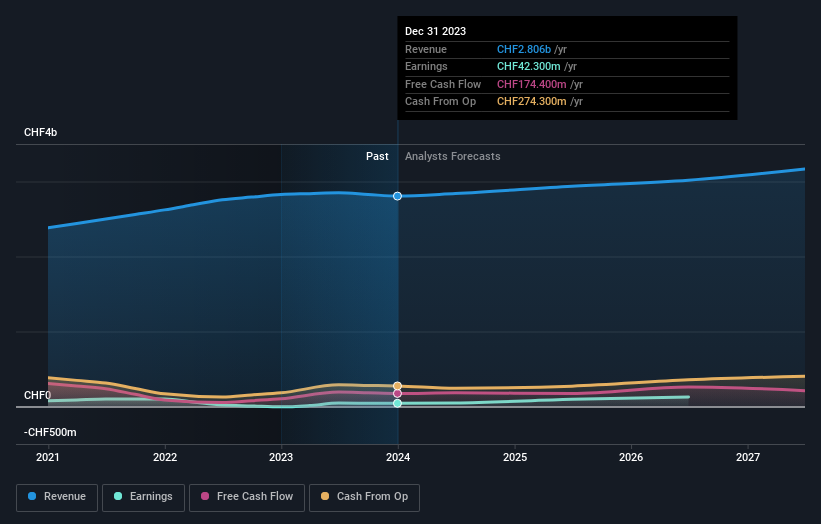- Switzerland
- /
- Building
- /
- SWX:DOKA
Investors in dormakaba Holding (VTX:DOKA) have unfortunately lost 16% over the last three years

In order to justify the effort of selecting individual stocks, it's worth striving to beat the returns from a market index fund. But in any portfolio, there are likely to be some stocks that fall short of that benchmark. Unfortunately, that's been the case for longer term dormakaba Holding AG (VTX:DOKA) shareholders, since the share price is down 23% in the last three years, falling well short of the market decline of around 3.1%.
So let's have a look and see if the longer term performance of the company has been in line with the underlying business' progress.
See our latest analysis for dormakaba Holding
To quote Buffett, 'Ships will sail around the world but the Flat Earth Society will flourish. There will continue to be wide discrepancies between price and value in the marketplace...' By comparing earnings per share (EPS) and share price changes over time, we can get a feel for how investor attitudes to a company have morphed over time.
dormakaba Holding became profitable within the last five years. We would usually expect to see the share price rise as a result. So it's worth looking at other metrics to try to understand the share price move.
The modest 1.8% dividend yield is unlikely to be guiding the market view of the stock. Revenue is actually up 5.9% over the three years, so the share price drop doesn't seem to hinge on revenue, either. It's probably worth investigating dormakaba Holding further; while we may be missing something on this analysis, there might also be an opportunity.
You can see below how earnings and revenue have changed over time (discover the exact values by clicking on the image).

We know that dormakaba Holding has improved its bottom line lately, but what does the future have in store? This free report showing analyst forecasts should help you form a view on dormakaba Holding
What About Dividends?
When looking at investment returns, it is important to consider the difference between total shareholder return (TSR) and share price return. The TSR is a return calculation that accounts for the value of cash dividends (assuming that any dividend received was reinvested) and the calculated value of any discounted capital raisings and spin-offs. Arguably, the TSR gives a more comprehensive picture of the return generated by a stock. As it happens, dormakaba Holding's TSR for the last 3 years was -16%, which exceeds the share price return mentioned earlier. The dividends paid by the company have thusly boosted the total shareholder return.
A Different Perspective
It's nice to see that dormakaba Holding shareholders have received a total shareholder return of 20% over the last year. And that does include the dividend. Notably the five-year annualised TSR loss of 2% per year compares very unfavourably with the recent share price performance. The long term loss makes us cautious, but the short term TSR gain certainly hints at a brighter future. It's always interesting to track share price performance over the longer term. But to understand dormakaba Holding better, we need to consider many other factors. Take risks, for example - dormakaba Holding has 1 warning sign we think you should be aware of.
If you would prefer to check out another company -- one with potentially superior financials -- then do not miss this free list of companies that have proven they can grow earnings.
Please note, the market returns quoted in this article reflect the market weighted average returns of stocks that currently trade on Swiss exchanges.
New: AI Stock Screener & Alerts
Our new AI Stock Screener scans the market every day to uncover opportunities.
• Dividend Powerhouses (3%+ Yield)
• Undervalued Small Caps with Insider Buying
• High growth Tech and AI Companies
Or build your own from over 50 metrics.
Have feedback on this article? Concerned about the content? Get in touch with us directly. Alternatively, email editorial-team (at) simplywallst.com.
This article by Simply Wall St is general in nature. We provide commentary based on historical data and analyst forecasts only using an unbiased methodology and our articles are not intended to be financial advice. It does not constitute a recommendation to buy or sell any stock, and does not take account of your objectives, or your financial situation. We aim to bring you long-term focused analysis driven by fundamental data. Note that our analysis may not factor in the latest price-sensitive company announcements or qualitative material. Simply Wall St has no position in any stocks mentioned.
About SWX:DOKA
Excellent balance sheet with reasonable growth potential.
Similar Companies
Market Insights
Community Narratives




